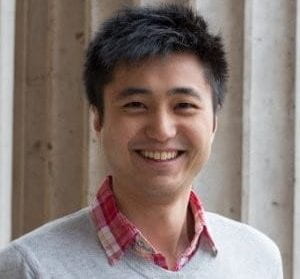
Conference Schedule:
9.30 – 10.00 Registration
10.00 – 13.00 Introducing Life & Health Sciences outside of Academia
Welcome by Institute of Child Health and an Introduction to UCL Careers
Keynote – GSK “Research: Bio Tech/Pharma”
Keynote – Medpace “Clinical Trials”
Keynote – Costello Medical “Science Communication”
Keynote – EY Parthenon “Life & Health Sciences Consultancy”
Q&A Session with keynotes
13.00 – 14.00 Lunch Break
14.00 – 15.15 Breakout Session
Option 1: Forum – Careers in UK and Global Health
Option 2: Forum – Careers in Government & Policy
Option 3: Workshop – The (Career)Path Less Travelled
15.30 – 16.00 Closing Remarks
16.00 – 17.30 Networking Drinks
Last chance to sign up:
Meet your afternoon speakers!
The breakout sessions are an opportunity to learn more about a specific area of health and life sciences. Choose between three great sessions covering careers in UK & Global Health, Government & Policy and a workshop on Entrepreneurial thinking. Interested in a career in public health, or becoming an advisor? The session on UK and Global Health could be for you. Fancy devising policy or working to support the healthcare system? Then our Government and Policy session could be your fit. Want to become an entrepreneur or learn key business skills? The workshop is an opportunity to hear from a UCL start-up.
Not sure which session to choose? Find out more below:
2pm – 3.15pm: Breakout Session
- Option 1: UK and Global Health Forum
- Option 2: Government and Policy Forum
- Option 3: The (Career)Path Less Travelled
UK & Global Health Forum
Speakers will be covering areas including research, public protection, global health and public health modelling:
Dr Laura Webber

Dr Laura Webber is co-founder and COO of HealthLumen, a global population health company that uses computer simulation models to build virtual populations to quantify the long-term impact of different policy, screening and treatment interventions.
HealthLumen acquired the modelling unit of the UK Health Forum (UKHF), a policy and advocacy organisation focused on the prevention of chronic diseases. At UKHF Laura was Director of Public Health Modelling, and led a multi-disciplinary team of epidemiologists, mathematicians, analysts, and computer programmers, co-ordinating global, European and national projects. Projects included the European Commission funded project ‘EConDA’ (Economics of Chronic Diseases), the Trust For America’s Health project ‘F as in Fat’, modelling obesity across each US state (http://healthyamericans.org/assets/files/TFAH2012FasInFatFnlRv.pdf), as well as various projects for Public Health England, Cancer Research UK, and the World Bank.
Laura holds an MA (Hons) from Cambridge University and a PhD in childhood obesity from University College London (Cancer Research UK studentship). She is honorary Assistant Professor at the London School of Hygiene and Tropical Medicine within the Health Protection Research Unit, and an occasional advisor to the World Health Organization and World Bank. She is lead author and co-author on a number of peer-reviewed publications and major reports. Laura was nominated for the Young Investigator of the year at Europrevent, Amsterdam (2015) and recently won the Open University Future Leader Award (2018), where she is studying for an MBA.
Lukasz Aleksandrowicz
Lukasz is a Portfolio Manager at Wellcome, alongside finishing a part-time PhD at the London School of Hygiene and Tropical Medicine. Wellcome is a major h ealth research funder, and Lukasz works specifically on the Our Planet, Our Health team, which funds research on the connections between global environmental change (like climate change and its impact on food systems) and human health. In his role, Lukasz is responsible for managing a portfolio of research, developing new funding initiatives, and helping define the Wellcome Trusts funding strategy.
ealth research funder, and Lukasz works specifically on the Our Planet, Our Health team, which funds research on the connections between global environmental change (like climate change and its impact on food systems) and human health. In his role, Lukasz is responsible for managing a portfolio of research, developing new funding initiatives, and helping define the Wellcome Trusts funding strategy.
Before this, Lukasz worked in a number of research roles across various parts of global health, though the majority of his experience was working at the Centre for Global Health Research in Toronto, Canada. Many deaths in low- and middle-income countries happen outside the health sector and are therefore not registered, leading to a lack of basic data on which disease burdens are most prominent. The centres focus was on tracking this “invisible mortality”. In that role, Lukasz helped develop the tools and surveys that were used in fieldwork, and helped analyse the trends in data.
Lukasz’s PhD is in the area of sustainable diets and uses an interdisciplinary approach (including data on nutrition, environment and economics), to investigate how food consumption in India can be both healthy and environmentally sustainable. Lukasz’s PhD did not start his career in global health, but has rather been on-going in parallel to it. Even in his current non-academic role, the PhD has proved to be valuable training. It has built his expertise in a topic area (food systems and environment), which he now use in his role funding projects on this theme. It has also developed his ability to critically evaluate many aspects of research: how research questions are defined, how projects and teams are built around them, and whether the methods and approaches used are appropriate.
Dr Elizabeth Goodburn MBBCh DRCOG DFSRH MSc PhD FRCGP

Elizabeth is a medical doctor with wide-ranging experience in international health focusing especially on maternal and reproductive health and primary care. After completing UK GP Training in 1985 she worked for 4 years as a Provincial Medical Officer in the Solomon Islands. Elizabeth’s subsequent international career included both long and short term assignments in Asia and Africa. Elizabeth’s research work, based at LSHTM, included collaborative health studies focusing on MCH and Reproductive Health among low income groups in W Bengal and rural Bangladesh. Elizabeth has worked for a variety of agencies, including DfID and the UN, on policy and strategy development with international partners, including several years as Chief Technical Advisor for UNFPA in Cambodia.
Elizabeth returned to UK General Practice in 2002 and was a GP Partner and Trainer in the James Wigg Practice serving a diverse inner city population in London until 2015. Elizabeth’s international work continued during this period on a consultancy basis. From 2013 to 2017, she was Medical Director for International Programmes (S& SE Asia) at the RCGP. Since January 2018 Elizabeth has worked as a Senior Technical Advisor for the SoapBox Collaborative as part of a partnership with WaterAid in Myanmar to improve IPC in health facilities. Elizabeth’s varied career has led to a strong commitment to health services development both in the UK NHS and internationally. Elizabeth’s work ethos is always to share experiences and foster productive partnerships based on mutual learning and respect with the aim of making good quality health care available to all.
Careers in Government & Policy
Our speakers will be covering areas including medical policy, regulation, health governance and policy consultancy from organisations including:
Dr Francisco de Matos Afonso Pereira
Pharmaceutical Assessor at the Medicines & Healthcare products Regulatory Agency (MHRA)
The MHRA is responsible for the regulation of medicines and medical devices used in the UK. This includes the authorisation of clinical trials and the evaluation and granting of Marketing Authorisation (licences) for medicinal products.
A Pharmaceutical assessor carries out the assessment of data provided in marketing authorisation initial and variation applications including those with new, wide-ranging or complex issues making appropriate recommendations and decisions in line with the protection of public health. We also provide scientific and regulatory advice to companies. Participation in international bodies such as the European Medicines Agency is common.
Francisco is a Portuguese and UK registered Pharmacist. Francisco did his undergraduate degree in Portugal and moved to London to pursue a PhD. His PhD thesis is entitled: “Sex, Drugs and Excipients: PEG 400 enhances the bioavailability of BCS class III drugs via P-glycoprotein inhibition”. The research work was conducted at the UCL School of Pharmacy and this was joint PhD with the University of Coimbra in Portugal. In this work he discussed how excipients are capable of changing drug disposition. Their role should not be underestimated. The degree to which excipients modulate drug bioavailability may be modified by sex. It is important that regulatory authorities and pharmaceutical industry take this knowledge into account during the pharmaceutical development stages of pharmaceutical products. This subject, closely related to drug product formulation, provided me with a strong foundation for my work as an assessor at the UK Regulatory Authority.
Dr Sara C Marques
 Sara is a Senior Researcher at the Health Policy Partnership (HPP), a consulting company specialised in health policy. HPP works on a range of short-term projects and runs the secretariat for two well-established multidisciplinary networks, All.Can and The Heart Failure Policy Network (HFPN).
Sara is a Senior Researcher at the Health Policy Partnership (HPP), a consulting company specialised in health policy. HPP works on a range of short-term projects and runs the secretariat for two well-established multidisciplinary networks, All.Can and The Heart Failure Policy Network (HFPN).
Sara’s work at HPP involves researching and writing about healthcare environments, in areas including cardiovascular disease, women’s health and personalised healthcare. Some of the reports Sara writes are external-facing, others for internal use. Sara is the Head of Programme of HFPN, an independent and multidisciplinary platform focused on raising awareness of the challenge heart failure poses to healthcare systems across Europe, and on the presentation of possible solutions to address the challenge.
Sara has a Master of Sciences of Pharmacy from the University of Lisbon, Portugal, and a PhD in Molecular Medicine from the University of Aarhus, Denmark. Sara’s PhD focused on response to treatment with doxorubicin in people living with diffuse large B-cell lymphoma, specifically on the impact of microRNA and RNA expression on the development of resistance to treatment. Towards the end of her PhD, Sara realised she didn’t want to continue working in Academia, and moved on to the health policy sector. Sara took on a role of Health Research Analyst at The Economist Intelligence Unit, where she worked in the development of value-based healthcare frameworks and studies of burden of disease in Europe, Canada and Latin America. Sara also wrote critical appraisals of health research for the National Institute for Health Research. This position led Sara to her current role at HPP.
“Academia researchers often develop a wide range of skills without even realising it – a comprehensive ‘toolbox’ that can be used across sectors. If you’re considering leaving Academia, identify your ‘toolbox’ and focus on your strengths. Put your research skills to use and identify the areas that seem to be a good fit!”
Dr Susannah Cleary
In her current role at NHS England and NHS Improvement Susannah leads or contributes to the development and delivery of strategic projects as a part of the Strategy directorate, drawing on problem-solving, project management and stakeholder engagement skills to plan and deliver work. This includes advising the CEO of the NHS and various NHS executive directors on strategy, tactics and messaging for issues affecting the NHS and its staff. Examples of specific projects Susannah has led include: benchmarking NHS hospitals’ compliance with nationally-defined cyber security standards and assessing the NHS’s cyber vulnerabilities. Susannah is currently part of the team developing the processes and implementation framework that will allow frontline NHS organisations and commissioners to implement the recommendations of the NHS Long Term Plan, the NHS’s 10-year strategic vision, which was published in January 2019.
problem-solving, project management and stakeholder engagement skills to plan and deliver work. This includes advising the CEO of the NHS and various NHS executive directors on strategy, tactics and messaging for issues affecting the NHS and its staff. Examples of specific projects Susannah has led include: benchmarking NHS hospitals’ compliance with nationally-defined cyber security standards and assessing the NHS’s cyber vulnerabilities. Susannah is currently part of the team developing the processes and implementation framework that will allow frontline NHS organisations and commissioners to implement the recommendations of the NHS Long Term Plan, the NHS’s 10-year strategic vision, which was published in January 2019.
Susannah’s PhD took her to the National Institutes of Health, NIH, the primary agency of the United States government responsible for biomedical and public health research, where she conducted the bulk of the primary research for her thesis. After doing a PhD, Susannah returned to the NIH for a postdoctoral fellowship, working on drug development for kidney cancer. During her NIH fellowship she undertook a detail in one of the NIH’s health policy shops, which turned into a year working at the Fogarty International Centre, the NIH’s global health institute. During that year Susannah evaluated the impact of US Government-funded training programmes to demonstrate that Fogarty-funded activity is building research capacity in recipient countries and is effecting change in country-level and international health policy. Susannah also developed and implemented a global health training course to promote awareness of global health amongst NIH staff and students and raised the profile of Fogarty International Centre. Susannah’s experience at the Fogarty International Centre led her to enroll in an MSc in International Public Policy at University College London.
Workshop: The (Career)Path Less Travelled
Entrepreneurial thinking and how it will shape your future
Envisaging your career beyond the academic sphere is not necessarily the hardest part; unravelling how to get there can be far more challenging. Despite being involved in activities that make them core sources of new knowledge and cutting-edge technology, few UCL researchers will take the time to recognise the extent to which their skills and experiences are entrepreneurial by nature. Even fewer will stop to acknowledge that being entrepreneurial is just as much about adopting a certain approach to your thinking and behaviour as it is about creating a new business or venture.
This workshop will focus on both of these elements, helping you to gain an understanding of what it means to be entrepreneurial as a researcher and how you should be capitalising on these traits to self-direct your career management. For those who are interested in creating spin-outs or their own start-ups, the workshop will provide practical advice and insight on how to move an idea forward and how UCL can help you to do so.
Janette Junghaus – Senior Programme Officer for Entrepreneurship, UCL Innovation & Enteprise

Janette coordinates a dynamic entrepreneurship skills programme for UCL’s doctoral and early career researcher communities, and builds relationships across the university to foster the development of entrepreneurial mind sets. Her professional background is rooted in fast-paced environments in the private sector, having worked in professional network management, PR, international architecture and design practices, and private equity. After completing a part-time MSc in Neuroscience, Language & Communication at UCL, she spent two years being part of a multi-disciplinary dementia research and public engagement project funded by the Wellcome Trust.

Dr Vassilis Georgiadis – Senior Partnerships Manager (Pharma & Healthcare), UCL Innovation & Enterprise
Vassilis is responsible for developing strategic partnerships between UCL researchers and external commercial partners, with a focus on pharma and healthcare sectors. Before joining UCL Innovation & Enterprise he was a Business and Innovation manager at UCL’s Translation Research Office, supporting industrial research collaboration activities through a faculty-facing role. Prior to that he was one of the founding members of Molecular Warehouse, a UK diagnostics and digital health startup.He’s a molecular and cell biologist by training, with more than 10 years of academic research in various biomedical areas. Vassilis studied for a BSc in Genetics at Queen Mary University, followed by an MSc in Clinical Neurosciences at UCL and a DPhil in Cell Biology at the University of Sussex

Dr Rebecca McKelvey – Founder and Director, in2scienceUK
Rebecca has a PhD in neuroscience from UCL and during her PhD she founded the social enterprise in2scienceUK. In2scienceUK’s mission is to improve social mobility and diversity in the STEM sector and works with young people from disadvantaged backgrounds helping them to achieve their potential and progress to top universities and research careers. The programme works by leveraging the skills and passion of researchers who give summer work placements and workshops to students. To date in2scienceuk has supported over 1,000 students in London, The South East and South West of England.
 Close
Close






















